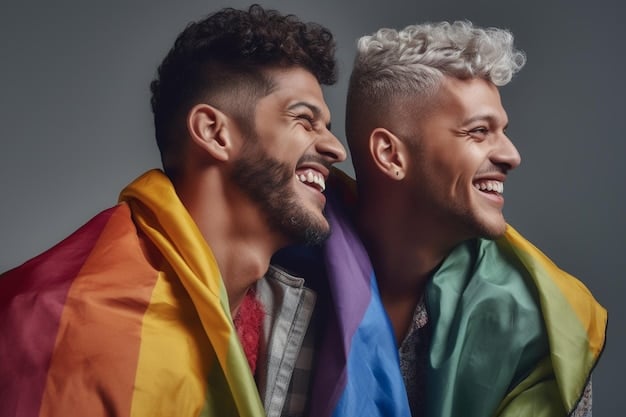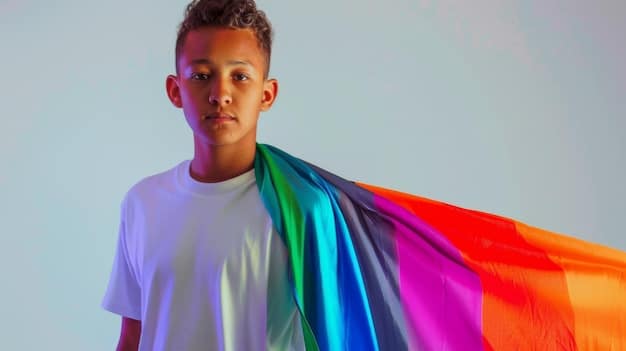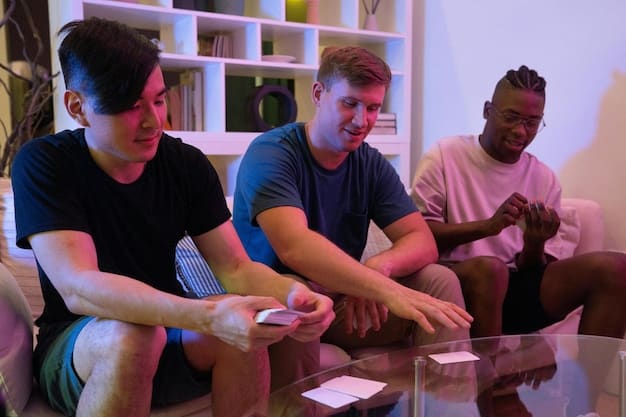LGBT Inclusion in US Esports: Sponsorship Impact in 2025

How are LGBT inclusion policies impacting team sponsorships in US esports for 2025? Increasingly, these policies influence brand decisions, promoting diversity and potentially affecting sponsorship deals as companies align with inclusive values.
The landscape of esports is rapidly evolving, and with it comes a greater focus on inclusivity and diversity. One critical area where this shift is becoming increasingly apparent is in team sponsorships. How are LGBT inclusion policies impacting team sponsorships in US esports for 2025? As brands strive to align with the values of their consumers, esports teams are facing pressure to adopt and promote LGBT inclusion policies.
This article explores how these policies are shaping the dynamics between teams and their sponsors, examining the potential impacts on the future of esports partnerships in the United States. Join us as we navigate the complexities of this intersection, understanding how inclusion is becoming a crucial factor in the esports arena.
The Growing Importance of LGBT Inclusion in Esports
The esports industry, once perceived as a niche market, has exploded into a global phenomenon. As its audience grows and diversifies, the demand for inclusivity and representation has amplified. LGBT inclusion, in particular, is becoming a focal point for both players and fans.
Why Now? The Shift Towards Inclusivity
For years, the esports community faced criticism for its lack of diversity and inclusivity. However, recent years have seen a significant push from within the community to advocate for better representation and safer spaces for LGBT individuals. This shift is driven by several factors:
- Increased awareness: Growing awareness of social justice issues has amplified the voices of marginalized groups within esports.
- Community activism: Grassroots movements and player-led initiatives have played a crucial role in advocating for inclusive policies.
- Consumer demand: Brands are recognizing that their consumer base values inclusivity, and they are seeking to align their sponsorships accordingly.

Understanding the importance of LGBT inclusion is not just a moral imperative; it is becoming a strategic one for teams and sponsors alike. Failing to address these issues can lead to backlash from the community, damage brand reputation, and ultimately impact the bottom line.
Financial Implications of LGBT Inclusion Policies on Sponsorships
The adoption of LGBT inclusion policies is not merely a symbolic gesture; it has tangible financial implications for esports teams and their sponsorships. Brands are increasingly scrutinizing the values and practices of the teams they sponsor, and those that demonstrate a commitment to inclusivity are more likely to secure lucrative partnerships.
Attracting Sponsors with Shared Values
Many companies are now prioritizing social responsibility as part of their brand strategy. These companies actively seek out partnerships with organizations that share their values, including a commitment to LGBT inclusion. This alignment can lead to:
- Increased sponsorship opportunities: Teams with strong LGBT inclusion policies are more attractive to socially conscious brands.
- Higher value sponsorships: Brands are often willing to pay more for sponsorships that align with their values.
- Long-term partnerships: Shared values foster stronger, more sustainable relationships between teams and sponsors.
However, there are also risks associated with not embracing LGBT inclusion. Teams that fail to address these issues may face difficulty attracting sponsors and could potentially lose existing partnerships. The question then becomes: How are LGBT inclusion policies impacting team sponsorships in US esports for 2025? Simply put, they are increasingly becoming a make-or-break factor. Embracing these policies can open doors to new financial opportunities, while ignoring them could lead to stagnation or decline.
How US Esports Teams Are Implementing LGBT Inclusion
The implementation of LGBT inclusion policies varies across US esports teams. Some teams have taken proactive measures, while others are still in the early stages of development. Examining these different approaches offers valuable insights into best practices and potential challenges.

Examples of Successful LGBT Inclusion Initiatives
Several US esports teams have already implemented successful LGBT inclusion initiatives. These initiatives include:
- Diversity and Inclusion Training: Conducting regular training sessions for players, staff, and management to raise awareness and promote understanding of LGBT issues.
- Inclusive Language Policies: Implementing guidelines for communication that avoid offensive language and promote respectful interactions.
- Partnerships with LGBT Organizations: Collaborating with LGBT advocacy groups to develop and implement inclusive policies and programs.
These examples demonstrate a proactive approach to LGBT inclusion, setting a positive example for the rest of the industry. By adopting these measures, teams can create a more welcoming and inclusive environment for players and fans, while also attracting socially responsible sponsors.
Challenges and Resistance to LGBT Inclusion in US Esports
Despite the growing support for LGBT inclusion in esports, there are still significant challenges and resistance to overcome. Some players, fans, and even sponsors may be hesitant to embrace these policies, citing concerns about tradition, cultural differences, or political beliefs.
Addressing Misconceptions and Pushback
One of the primary challenges is addressing misconceptions and stereotypes about the LGBT community. Some individuals may hold prejudiced views or harbor fears based on misinformation. Overcoming these misconceptions requires education, open dialogue, and a willingness to challenge existing beliefs. Additionally, some may resist LGBT inclusion policies due to concerns about:
- Perceived reverse discrimination: The belief that prioritizing LGBT inclusion may disadvantage other groups.
- Cultural differences: The argument that LGBT inclusion policies conflict with cultural or religious values.
- Political beliefs: Opposition to LGBT rights based on political or ideological grounds.
Addressing these concerns requires a nuanced approach that acknowledges the validity of different perspectives while also upholding the importance of inclusivity and respect for all individuals. By engaging in constructive dialogue and providing education, it is possible to bridge divides and foster a more inclusive esports community.
Future Trends: LGBT Inclusion in US Esports by 2025
Looking ahead to 2025, it is clear that LGBT inclusion will continue to be a significant factor in US esports. Several emerging trends are likely to shape the landscape, impacting team sponsorships and the overall industry.
Predictions for the Next Few Years
Several trends are expected to drive LGBT inclusion in US esports in the coming years, including:
Increased Brand Activism:
Brands will increasingly use their sponsorships to advocate for social causes, including LGBT rights. This will put pressure on teams to adopt inclusive policies in order to attract and retain these sponsors.
Greater Player Activism:
LGBT and ally players will continue to use their platforms to advocate for inclusion and challenge discriminatory practices. This will raise awareness and create a more inclusive environment within the esports community.
Formalized Inclusion Policies:
Esports organizations and governing bodies will likely develop more formalized inclusion policies and guidelines. This will provide a framework for teams to implement best practices and ensure accountability.
The trajectory suggests that how are LGBT inclusion policies impacting team sponsorships in US esports for 2025? They will become even more influential. Teams that proactively embrace and promote LGBT inclusion will be well-positioned to thrive in the evolving esports landscape, attracting sponsorships and building a loyal fan base.
Balancing Profitability and Principles: A Sustainable Approach
For esports teams, the challenge lies in finding a balance between profitability and principles. Embracing LGBT inclusion is not just about doing the right thing; it’s also about creating a sustainable business model that aligns with the values of its stakeholders.
Strategies for Sustainable Inclusion
To ensure that LGBT inclusion is sustainable and impactful, teams should consider the following strategies:
- Long-term commitment: Inclusion should not be a one-time initiative but rather an ongoing commitment that is integrated into the team’s culture.
- Community engagement: Engage with the LGBT community to understand their needs and perspectives. This can help teams develop more effective and authentic inclusion policies.
- Transparent communication: Communicate openly and transparently about the team’s commitment to LGBT inclusion. This can build trust and accountability with fans and sponsors.
By implementing these strategies, esports teams can create a truly inclusive environment while also strengthening their brand and attracting socially responsible sponsorships. This holistic approach ensures that profitability and principles go hand in hand, creating a sustainable future for the team and the esports industry as a whole.
| Key Point | Brief Description |
|---|---|
| ✨ LGBT Inclusion | Essential for attracting socially responsible sponsorships. |
| 🤝 Brand Alignment | Sponsors seek teams sharing their values. |
| 🌈 Initiatives | Training, inclusive language, partnerships are crucial steps. |
| 🚀 Future Trends | Expect more activism, formal policies, and brand involvement. |
FAQ
LGBT inclusion policies greatly influence sponsorships by attracting brands that prioritize diversity and social responsibility. Teams without such policies may miss out on lucrative deals.
Examples include diversity training, inclusive language guidelines, partnerships with LGBT organizations, and creating safe spaces for LGBT players and fans.
The esports community is growing and becoming more diverse, leading to increased demand for representation and safe spaces for LGBT individuals.
Teams may face resistance from players, fans, or sponsors who are hesitant to embrace these policies due to misconceptions or cultural differences.
Teams can ensure sustainability through long-term commitment, community engagement, transparent communication, and integrating inclusion into the team’s overall culture and values.
Conclusion
As we’ve seen, how are LGBT inclusion policies impacting team sponsorships in US esports for 2025 is a complex issue with far-reaching implications. The trend towards greater inclusivity is undeniable, and teams that embrace these policies are more likely to thrive in the long run.
By educating themselves, engaging with the LGBT community, and implementing meaningful inclusion initiatives, esports teams can create a more welcoming and equitable environment for all. This not only aligns with ethical principles but also positions them for greater success in the evolving esports landscape.





